M. Lachi's Blog, page 2
December 7, 2017
Thoughts with New York Times Bestselling Author of the "Relentless" Series, Karen Lynch
A native of Newfoundland, Canada, she now lives in North Carolina, the home of my alma mater! I stumbled upon Karen and her Relentless series through literary agent, Stephanie Hansen, as she represents us both.
Lynch released her latest novel from the Relentless series, Haven, on May 2, 2017, and it's already received heaps of love from her followers.
Good Reads

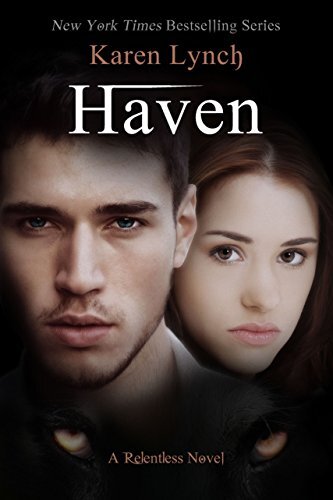 1. What inspired you to write urban fantasy and the Relentless series specifically?
1. What inspired you to write urban fantasy and the Relentless series specifically?I’ve always been a fan of urban fantasy so it felt natural to write in that genre. I got the initial idea for Relentless from a dream. I say initial because the final book was nothing like the dream.
2. Do you avoid or embrace Fantasy/Paranormal tropes and why?
I don’t necessarily avoid tropes, but I try not to be cliché. There are certain aspects of each genre that draw readers. You need to figure out how to write them in a fresh way.
3. Do reader comments and reviews about your storyline and characters effect your writing in subsequent books?
The only feedback I consider seriously is from beta readers and editor. Readers have such different tastes and you can’t write something to please them all. When you get a 5 star rave review, followed by a terrible 1 star review, which one do you believe? If you believe in what you’re writing, you can’t let strangers influence you.
4. As a woman writer, do you find it difficult to write a male voice?
I did at first. When I started writing Warrior, which is the trilogy in Nikolas’s POV, I struggled at first. By the end, we were like old friends. The next book was dual POV and I had no trouble writing the mail voice in that one.
5. What are your thoughts on how female leads are portrayed in current Science Fiction and Fantasy novels and films?
One of the reasons I like YA is because more and more authors are writing strong, independent female leads. Yes, there is usually a love interest, but the story is about her journey.
6. When reading a book, does the gender or ethnicity of the author impact the voice you assign the novel in your head?
Never. If a story is well-written, I don’t think about the author at all while I’m reading it.
7. What advice would you give your younger writer self?
Good question! I’d probably tell her to stop doubting herself and to write that damn book. I spent too many years comparing my writing to published works and that’s a huge mistake for any writer. No first draft looks as good as one that’s been through multiple drafts and professionally edited.
8. How can an author cope with feeling their story deserves to be heard, but fearing criticism?
I don’t know a single author who doesn’t have self-doubt when putting a new book out there. And even the greatest literary works have bad reviews. Look for them on Amazon and you’ll see what I mean. You will get negative reviews. But you’ll also get great reviews. You can’t dwell on reviews. It’s all a part of the business.
9. What’s next for Karen Lynch?
I’m current working on Fated, book 6 in the Relentless series, which will be released on Feb 13, 2018. After that, I have several projects planned. I need to decide which one comes next.
November 9, 2017
Thoughts with Jarrod D. King, Author of 'Pangaea: Unsettled Land'
Jarrod is a tenacious fantasy and science fiction author who seeks to bring a new voice to the world of fiction. His debut novel Pangaea: Unsettled Land (2016) stars a black, gay lead who finds himself emboiled in a heap of love triangles and power struggles. As he and his band of heroes journey to find an ancient key, they also journey to find themselves.
Jarrod also runs a podcast called LGBTR (Lots of Good Books to Read) where he interviews other POC LGBTQ_ authors. Check out his growing list of black LGBTQ+ authors here!

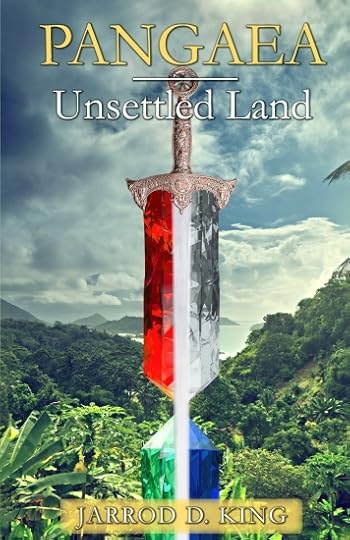 GoodReads
GoodReads1. What inspired you to write Fantasy and this novel specifically?
I was always enthralled by big stories. Fantasy and science fiction stories (whether in video games, anime, movies, etc.) always feel fresh and unique. So, they’ve always been an influence. As far as this book goes, I remember feeling that there were ways that I could make the genre better. While I love the genre, there are a lot of straight white men running the show who shoot from the hip and deliver a lot of corny one-liners. I felt I could avoid certain tropes, introduce new types of characters you don’t usually see, and really hit you in the emotional gut. I know I did that for some, and I hope it’s a story even more can connect with.
2. In comparison, there are far fewer black authors in Fantasy and Sci Fi. Why is this and how can it be rectified?
I believe there are many more black authors in these genres than we realize, but that is the perception because of the way the traditional publishing industry works. While well-meaning, agents and publishers who say they’re looking for diverse stories may think your book is too “niche” to make any money, so they pass. You could make the argument that self-publishing helps bypass this, but it’s still very new. It doesn’t yet have the same level of prestige that traditional publishing has, so some authors chase the prestige. Those who do self-publish will find that it’s very expensive to hire an editor, cover designer, etc., and if they can’t afford it, they either put out sloppy work or avoid the process altogether. Then, there’s marketing your book which is a whole different set of dilemmas. I believe self-publishing is the way to go, but you have to do it right, which means educating yourself about what it takes to put out traditional publishing-level work and how to market it best to your audience. I think if more black authors do that, we will see a lot more fantasy and sci-fi from them.
3. What are your thoughts on how LGBTQ+ characters are portrayed in major novels and film?
Things are getting better, but we’re still mostly at a point where LGBTQ+ characters are either a stereotype or just not seen at all. Mainstream audiences are getting used to “the gay best friend” or the “token gay guy”. And in most instances, these are white cisgender male characters. I love some of the characters, but that hardly covers the broad spectrum of people who have yet to been seen at different intersections. What about the Black trans woman, the Asian bi man, or the Latinx lesbian? And why can’t they be important enough to have a full storyline other than coming out? As I said, things are getting better, but part of my goal in writing Pangaea was addressing this issue. Two of main characters are males who are Black and just happen to be gay - that’s not the sole focus of their character. I wanted to show that you can definitely create an epic tale with characters like these and get so into the story that sometimes you forget that’s what they are.
4. Characters in your story are non-black and non-LGBTQ+. What do you do to get into the mindset of these character, so much so that you can write their voice?
As a black man, I’ve been inundated with white culture with everything from classic Disney animated movies to the books and movies I read and watch today. I also grew up in neighborhoods and schools that had a white majority. The same can be said for me as a gay man with straight culture. So, I didn’t have to dig too deep to get the essence of my White characters. I just treated them as human beings with their own specific ways of being and had them react the way they would given the circumstances on the page. The same goes for my other characters of color. While I may not be well-educated in different cultures, these are still human beings who, based on their personalities, will react a certain way in any given scenario. It really wasn’t hard. It also helped that this was a fantasy world, so I didn’t have to research cultures so much - I just made up my own.
5. When reading a book, does the gender, preference or ethnicity of the author impact the voice you assign to the novel in your head?
The author doesn’t impact the voice I hear in my head. I pay most attention to the main character and get a feel for their voice based on things like dialogue, setting, and time period.
6. What are you currently reading and why did you pick it up?
Right now, I’m reading Make Every Man Want You by Marie Forleo. It’s non-fiction, I’m a fan of hers, and while it’s addressed to female readers, Forleo said it’s great book for guys too. So I gave it try and I have to say, it really is. It’s not about dating, it’s about being your best self and using that as a natural attractor to better partners and opportunities. I’m big on self-improvement, so I’ve read a lot of books like this over the past couple of years and put what I’ve learned into practice. Aside from that, the last fiction book I read was N.K. Jemisin’s The Hundred Thousand Kingdoms . I wanted to see what another successful black fantasy author was doing and what I could learn. I enjoyed it very much!
7. How can an author cope with feeling their s tory deserves to be heard but fearing criticism?
I would first say to just complete that first draft. Nobody has to see anything, just get it done and get the story out of your system. Then, I would say, the best defense against criticism is making sure the book is edited to the best of your ability. Safeguard yourself against comments about grammar, story structure, cultural sensitivity, triggers, and more by getting beta readers to take a look and by hiring a professional editor. If you can survive your editor’s countless red marks and get a better version of your story, you’re on your way. (I couldn’t look at my editor’s notes for a month.) Lastly, take a good look at why you want to tell the story and be real sure about your conviction to share this story with the world. You’ve got a grow a thick skin, because even after all of that, you can’t please everybody.
8. What else do you do outside of writing, and how do you juggle life and writing?
Right now I work for a company doing search engine optimization, and I also host a live YouTube show that I recently renamed as LGBTr, which stands for Lots of Good Books To Read. In this show, I interview other Black LGBTQ authors. I juggle life and writing by making myself write every day after work or at least do something for the YouTube show or promotion. It’s tough, but I want to eventually work for myself, so I’m doing all that I can to make that happen.
9. What’s next for you on your writing journey?
I’m currently drafting a science fiction novel that I already know is going to be something special. I’m also looking ahead to continuing the Pangaea series with a collection of short stories as a prequel to the first book, and a continuation of the story with a direct sequel. I’m also doing my best to make my YouTube show more of a regular thing. I’ve got more that I want to do and I’m pretty optimistic about what the future holds.
November 2, 2017
Thoughts with Leonora Meriel, Author of "The Unity Game"
The Unity Game (published May 2017 by Granite Cloud) is Meriel's second novel and was called an “ambitious and thought-provoking novel” by Kirkus Reviews. And the thought-provoking read continues to receive numerous reviews on Amazon and Goodreads. Leonora grew up in London but has lived in New York, Kyiv and Barcelona. She worked in business before turning to writing full-time.
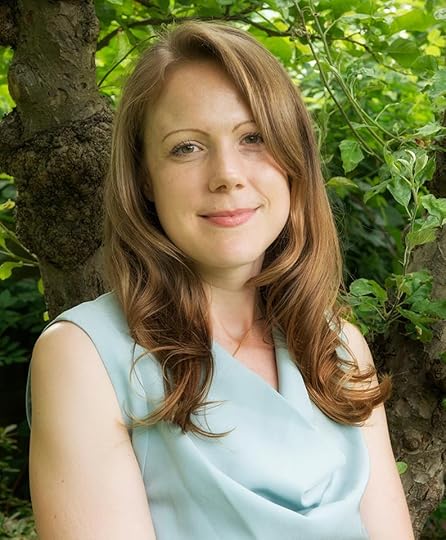 Leonora Meriel
Leonora Meriel 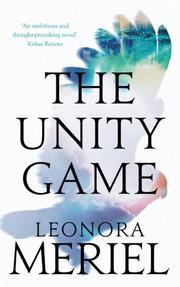 What inspired you to write this novel?
What inspired you to write this novel?My debut novel, as is often the case, was introspective, poetic, dreamy, and focused on human emotions rather than plot. It was a deeply personal work about generations of women in Ukraine that had taken me five years to complete. By the time I had finished, I had a burning inside me to write something that was different in every possible way. Thus – my main characters were an ego-driven man and a genderless alien. My locations were New York City, a distant planet and an after-life dimension. And my themes were – the meaning of life on Earth, the meaning of everything, how everything connects in the grand scale. I was at last able to release my writing in all the directions it hadn’t been allowed to travel while I was concentrating on my first book.
What drove you to write within the Science Fiction genre?
Science Fiction for the main part deals with the future, or with alternative realities. As someone who likes to think about the meaning of everything in our history and on our planet, it is really the only genre which gives a wide enough range for expressing philosophical, metaphysical or futuristic scenarios. I am a firm believer that what we are able to perceive as humans on Earth is a tiny proportion of what is in the universe, and I think that writers and artists have a very serious responsibility to be the ones to envision and suggest and project scenarios that could well turn out to be true, but which we cannot even test without the extrapolated possibility.
In comparison, there are far fewer female authors within Science Fiction. Why is this and how can it be remedied?
There are two main reasons for this. The most obvious is – that there are traditionally less women in science, and it has been considered a man’s field. Thus, as women over the centuries found their voices in literature, they chose subjects where they were strong, such as everyday details and relationships, rather than subjects where they were unequal in knowledge.
However, I think this is being overturned already – first of all by women rising in Science and Maths, and being loud about their contributions. The recent movie “Hidden Figures” was a great example of this shift. And check out Sabrina Gonzalez Pasterski and if you have any doubt as to whether women are going to continue keeping quiet about their part in scientific progress. It won’t be long before women writers are taking on the hard science areas of science fiction – and I can’t wait for it to happen. In fact, I might petition Gonzalez Pasterski to start the trend! However, there are plenty of areas of Science Fiction where you don’t need hard science. Ursula Le Guin is of course the queen of Sci-Fi women writers, but she is too often used as the stand-out. Margaret Atwood writes on the edge of Sci-Fi, and we have for a female classic Madeleine L’Engle. And there are many female writers now forging careers and feeling free and empowered to do so.
I believe the way to remedy this is for the women who are writing in this genre to be bold and loud and promote themselves and support each other. Make sure that the world knows that they are present and writing and part of the conversation. It is time to change the story – and this is both our specialty – and our profound responsibility.
What are your thoughts on how women are portrayed in Science Fiction novels and films?
The portrayal of women in films is extremely frustrating. 90% of the time, even if the women have a major part, it feels like pornography. I always do an experiment for myself just to test my paranoia level – I imagine the men in the films dressed equivalent to the women and the women dressed equivalent to the men. Of course, this would mean men in tight, flimsy costumes showing large amounts of flesh, and women in perfectly normal clothes. Then I get angry again. It is something that simply has to change, otherwise women will continue to be viewed only in relation to men, and never in their own right.
With regard to books, it is less easy to write great literature nowadays without developed female characters, and so it is rare for me to notice overt sexism in serious modern science-fiction. However, I would like to see much more writing from a future perspective, looking back on “the ages of inequality.” I feel we need as many books as possible establishing the current model as obsolete before we can truly leave it behind.
In light of women coming forward, in Hollywood and around the globe, rebuking the “boy’s club” mentality, do you think we will begin to see a change in the way women are portrayed or treated in the media?
I think with regards to Hollywood, that it will be extremely slow, and will only happen when women control the money and the ultimate decisions – and we are a very long way from that point. Until then, it will be microsteps, most likely empty gestures disguised as progress, such as powerful female characters who are still dressed like porn stars and have stereotypical bodies. The real progress will most likely come from small productions upwards, for example, Britt Marling’s excellent OA. And for her own brush with Hollywood sexism, here is an excellent piece by her:
When reading a book, does the gender or ethnicity of the author impact the voice you assign the novel in your head?
The ethnicity of a writer has no impact on my reading of a character, however the gender of a writer can influence this, as I am always fascinated at how accurately women write deep, complex male characters, and visa versa. I am always impressed when writers truly capture someone of a different gender, and I seek to learn techniques from them. I equally enjoy writing male and female characters, and I even have a genderless character in my novel, so it is something I follow closely.
What are you currently reading and why did you pick it up?
I’m reading We by Yevgeny Zamyatin. Russian / Soviet Science Fiction is a gap in my reading that I’m trying to fill. I lived in Ukraine for ten years and gathered a list of “must-read” books from my friends and this was at the top of it. I’m also particularly interested in the Russian view on Sci-Fi as I have read some British/American ones and recently Chinese (Ken Liu led me to Liu Cixin) and I am now interested in more world perspectives.
What are some good writing habits you’ve discovered?
I have written in very different circumstances, so I am aware that each writer struggles to find time and discipline in their own way. I have written with no time or financial pressures. I have written to a launch deadline. I have written with 2 children and a crazy household going on around me.
The habits that have stuck with me are:
Write early in the morning, for as long as the creativity flows. When it switches off, leave it for the day and don’t try to force it.Write whatever story is pulling you. Sometimes in the middle of a novel, you will need to write a short story or 6 poems. Do that.Revel in the terror and elation that comes with writing first drafts. Elation for the first 30 minutes after you have finished your session; and terror when you realize it is the worst thing ever written. These emotions are sure signs that you are on the right path.
How can an author cope with feeling their story deserves to be heard, but fearing criticism?
This is simple: you have to be brave, brave, brave.The writer’s job is really extraordinary, in that every piece of work you want to earn money for, you have to put into the public where literally every person on Earth, now and into the foreseeable future, can judge you! It’s terrifying, horrific, and the bravest thing you will ever do in your life – especially the first time you publish.
My advice is – be ready with some statistics. Expect 70% positive reviews and 30% terrible reviews. Expect the press to be extremely harsh. Expect your mother to be extremely biased. This is a total cliché, but some readers will absolutely love your work and some will think it’s the worst thing ever written. My experience, over a year and a half: with overall 80% 5* reviews, I have received an e-mail from a reader telling me my novel was the best thing she had ever read and I am now her favorite writer. A couple of days later I had two 1* reviews saying it read like a first draft, and sounded like I had written it drunk.
This is what you get, especially with speculative fiction – some people are open to experimentation and love it; and some hate it when you go off template.
But at the end of the day, the only thing you really need is courage. And lots of it.
10. What else do you do outside of writing great books, and how do you juggle life and writing?
I struggle to balance everything in my life! I have 2 teenagers who demand a lot of time (in the most wonderful and exhausting way) and I also teach part time to maintain my income. I have to write and read a lot, of course, and when there are pockets in between this I run and travel, go dancing and spend time in Barcelona and New York, my favorite cities.
11. What’s next for you on your writing journey?
A lot more novels. I have now launched 2 novels and I very much hope that the process will get easier. Not the writing itself – as I will always challenge myself to the maximum in every piece of work – but the editing journey, which has to date taken months and years. I hope that my first drafts will get faster and better, and my editing skills sharper. And of course – that most wonderful gift at the end of the novel rainbow – the readership! I have been incredibly lucky to have dedicated readers and it will most certainly help the journey knowing that they will grow.
April 25, 2017
Hybrid Publishers - A Growing List
 Hybrid Publishing is an emerging third option for authors uninterested or unable to either self-publish or trade publish. This method of publishing—also known as partnership publishing or copublishing—claims to foster the best of both the vanity and traditional, publishing paths. In actually, hybrid publishing generally encompasses everything in between, and thus means something slightly different to each publisher.
Hybrid Publishing is an emerging third option for authors uninterested or unable to either self-publish or trade publish. This method of publishing—also known as partnership publishing or copublishing—claims to foster the best of both the vanity and traditional, publishing paths. In actually, hybrid publishing generally encompasses everything in between, and thus means something slightly different to each publisher.Some less adaptable to change dismiss hybrid publishing as a glorified vanity press, yet the option does rise above the pay-to-play fray in several ways. Here are some of the more prevalent attributes of a hybrid:The author invests in part to the publication of their work (vanity-esqu)The author receives a healthy portion of royalties (vanity-esqu)The author benefits from organized marketing plans/teams and varying degrees of distribution (trade-esque)The publisher often has a somewhat selective submissions process (trade-esque)The publisher often handles editorial and design needs (trade-esque)
I took great interest in this realm of publishing, but was left wanting when searching for a listings page. So I decided I’d start one! Here is a small but growing list of hybrid publishers.
50+ Hybrid Publishers
Name
Distribution
Notes (most notes are my opinion and can change)
“Wordwide access to bookstores”
Prices listed on site
E-Books and POD
No startup fee, part of Booklocker.com
“Online and Offline retail outlets”
Business books
-
Crowdfunding used to raise funds
-
-
Amazon / KDP
-
Book Trope
No longer operating
Was not run by authors or literary pros. I believe their failure has no bearing on hybrids.
E-Stores, POD, possible Brick and Mortar
Author pays production costs, BQB pays marketing and distribution costs
E-Stores and POD
They vet books, but are a division of Columbus Publishing Lab (who does not vet)
-
Australia based micropublisher, also has a self-publishing arm
“Global distribution”
Non-fiction, Speakers
E-Stores and POD
Imprint of Burning Eye
IPG
Children’s Books
E-Stores, POD
Christian Books
Christopher Matthews Publishing
“distributed on and offline worldwide”
Focuses on debut authors
E-Stores and POD
Makes no money unless you do
Bookmasters Distribution (Wholesale and Retail)
Christian authors
E-Stores, POD
Reads like a Vanity
Online and Brick and Mortar
An imprint of WiDo
Macmillion Dist (prefers to focus on e-stores)
Romance Fiction (has various imprints)
AtlasBooks Distribution
Unique inspirational works
E-Stores and POD
Focused on design technology
-
Contemporary Fiction
-
Offers Advances, non-fiction, self-help only
-
Christian Authors
Amazon / KDP
-
E-stores and POD
Very hands on, but very similar to a vanity.
Major in house distributor
Rumored to be a good experience but very expensive.
Ingram, Baker and Taylor (E-Stores and POD)
YA, Children’s and Picture Books
E-stores and POD
Based in Canada
Ingram and Independent bookstores
Crowdfunded. Once an author hits 250 preorders, they receive trade-esque publishing
E-stores, POD and some chains
Very similar to a vanity.
“Full scale in-store distribution”
Inspirational nonfiction
Amazon
Focuses heavily on design (no sci-fi, poetry or romance)
E-Stores, Brick-and-Mortar, Audio
Fiction, nonfiction, children’s, and Cook books
-
Very little info on website
E-stores and POD
Reads like a Vanity and has numerous past complaints
E-Stores and POD
Australia. Offers authors 20% royalties
Not Mentioned
-
-
Uninformative Website
-New Age, Poetry and Non-fiction
E-stores and POD
Will invest more into the author as the author’s sales hit certain milestones
-
Focuses on Romance and some Horror
Ingram and LS (E-Stores and POD)
Focuses on science themed fic and nonfic, offers trade deals
E-Stores and “traditional distribution channels”
Focuses on Secularists, Atheists and Humanists
Ingram ISP (E-Stores and POD)
Has published over 400 female authors.
“Distribution…on six continents”
Uses a crowdsourced voting system. 1000 votes gets publication, 2000 votes gets promotion etc.
Ingram (E-Stores and POD)
Has a bestseller
“distributed on and offline worldwide”
An NA YA division of Christopher Matthews Publishing
-
YA and Adult contemporary romance
Some E-Stores, POD, some brick and mortar
May be outdated. Mentions Borders.
-
Only serves fiction writers, memoirs, poetry and short stories based in Southern California.
“World’s largest distributor”
Website looks cool but has interesting typos
-
Once crowdfunded, author receives trade-esque publishing.
E-Stores and POD
Has a few award winning titles
E-Stores
EU-Based.
* This list only includes those companies that self-proclaim (or has a published article referring to them) as a hybrid or partnership publisher. Also note that anything in quotes was taken directly from the website.Okay, there you have it folks. If you’re considering hybrid publishing, be sure to submit to publishers who vet their submissions, who have distribution channels you could not obtain otherwise, and whose brand is more than a sales pitch.
If you know of any hybrid publishers not listed here, please let me know their name, link and possibly their distribution channels so I can add them to the list.
Happy publishing!
April 15, 2017
100 Years of Solitude
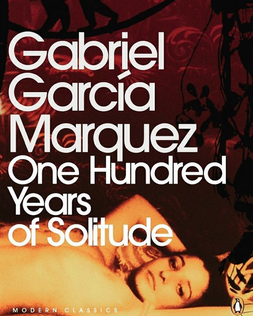 Unable to truly understand the concept of magicalrealism, I finally hunkered down and read "100 Years of Solitude" by Gabriel Garcia Marquez, a hefty book that fellow authors couldn't believe I hadn't read yet.
Unable to truly understand the concept of magicalrealism, I finally hunkered down and read "100 Years of Solitude" by Gabriel Garcia Marquez, a hefty book that fellow authors couldn't believe I hadn't read yet.⭐⭐⭐⭐⭐
Magical realism mixed with hints of poetic absurdism-we follow the fascinating, complex lives of the Buendia family through generations as they attempt to outwit preordained cyclical omens.
Starting from their Patriarch Jose Arcardio Buendia, the family assumes they are destined for greatness; however, they must overcome this stubborn ideology in order to obtain that greatness. The story is laden with beauty and sadness with its constant stream of bleak prose, yet the matter-of-fact-ness in tone keeps any tears at bay.
Refreshingly, the book is not one of the high-pressure sales SFF books we're inundated with today, as it was written in the 60s as a meta-assessment of Latin American history.
Instagram post
December 22, 2016
The Burn Notice (working title)
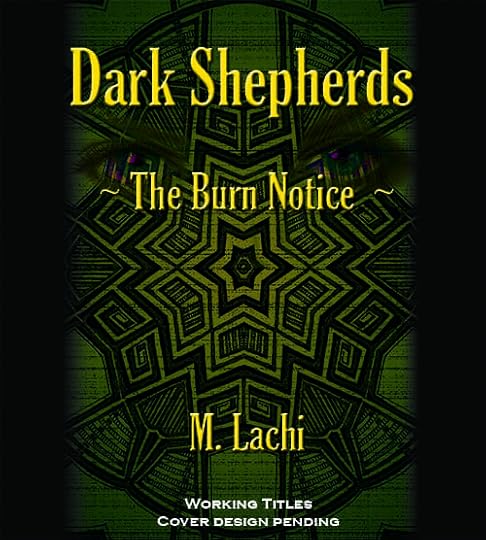 Super excited to have finished my second full length novel tentatively titled The Burn Notice, a standalone first in the series Dark Shepherds.
Super excited to have finished my second full length novel tentatively titled The Burn Notice, a standalone first in the series Dark Shepherds.The book is an adult science fiction with elements of thriller, mystery, metaphysical/visionary, romance, and one of my favorite genres, mind-f*ery. It is a foray into the reprocursions of an overly-utopic technocracy, a look into metaphysical human communication beyond our three-dimensional flatland, and a voyage into the question, what is good and evil, or are they just two points on a graph of infinite choice?
I'd originally wrote the novel during the months of November through January of 2016, then music'd (my day job) for several months, then jumped into the rigorous editing process. As much as I adore composing music, I love writing novels/stories. It appearts to be what keeps me smart.
Because this novel is based on the fantasy's I'd cook up during my maladaptive-daydreaming childhood, I am very much one with this story and it's journey, and really owe the survival of my childhood to it.
So keep watch on Instagram and Twitter as I perfect my query and distract myself with random thought experiments, goofy laugh-at-life pics, and reviews on books you should reqd!
December 7, 2016
Gone Girl
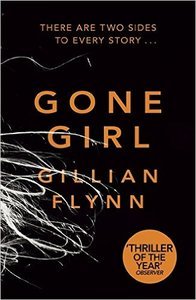 I'd been told it was a psychological thriller. Aware there'd been a movie yet unaware of the genre or content, only that it was a best-seller, I picked it up.
I'd been told it was a psychological thriller. Aware there'd been a movie yet unaware of the genre or content, only that it was a best-seller, I picked it up.A not so perfect husband is accused of murdering his too perfect wife, or did she murder herself? or did she murder his 'self,' or had he murdered hers? The true crime suspense novel is full of intelligent riddles and just plain smart writing. I felt it started a little slow, and dragged in a spot or two, but when it picked up, it had me laughing, angry and anxious, frantic to get to the next page and find where the hell Flynn was taking us with this trip.
I give this novel 5-stars, dispite my utter infuriation with its twists and twistednesses. Definitely an intellectual mind-F that deserved to be movie-fied. I will be reading more Flynn.
November 27, 2016
A Quick Consideration of Arrogance
 I receive a healthy handful of private messages on Instagram and Twitter: mostly hellos, high-fives and how-do-yous. Every once in a while, I'll receive a thought provocation causing me to set down my phone to explore it with whoever is in earshot and willing to converse. I recently received such a question, and while typing out my response, I (through the very nature of the response) realized it was blog-worthy.
I receive a healthy handful of private messages on Instagram and Twitter: mostly hellos, high-fives and how-do-yous. Every once in a while, I'll receive a thought provocation causing me to set down my phone to explore it with whoever is in earshot and willing to converse. I recently received such a question, and while typing out my response, I (through the very nature of the response) realized it was blog-worthy.Question
Hi M,
...
Do you ever feel like writing creatively is incredibly arrogant, and pointless when there's so much in the real world that's so powerful? I've been thinking about it a lot, and it's really an awkward thing trying to write fiction, because for me personally I have to take bold, calculated risks in the real world to get outside my own head.
Anyway, just wanted to say hi, and thanks!
Best,
Will
Response
Hi Will,
Thanks for writing!
I thought about your notion - how writing creatively can be perceived as arrogant and pointless considering the density of real world experiences and our need of the real world in order to write creatively in the first place.
I find that creative writing, especially in the realm of science fiction, is incredibly un-pointless and has arguably been a hefty contributor to social evolution and scientific innovation. There are countless examples of real world technological advancements born from novels and creative arts: rockets, cellphones, helicopters, submarines, 2nd Life, right down to the very word Robot coined by a playwright in the 1920s.
Is creative writing arrogant? Yes. I'd say producing (a.k.a creating) anything is arrogant. Finding oneself worthy enough to contribute to society by taking their insides and pouring it forth in any fashion is arrogant: down to the hard truth that bearing children, though etched into our DNA and (again arguably) our purpose for existence, is arrogant. "Who are you to continue your line of genes?" a critic might ask acerbically. "What makes your traits so special?"
However; to lock oneself in a cave, attempting to avoid arrogance yet keeping all of one's creative potential to oneself, is also a selfish act. Moreover, to choose to deny oneself pleasures and external stimuli rings of self-absorption. The act of choosing on behalf of the self is, in and of itself, self...ish; and to choose not to choose is also a choice.
So if to do is arrogant, and to not do is arrogant, and if to resign oneself to suicide so as to avoid the dilemma is also arrogant, the real question is...what isn't arrogant?
Keep writing! :)
Best,
M
November 21, 2015
Underrepresentation of Minority Groups in Media: A Reflection of Racism or Economics?
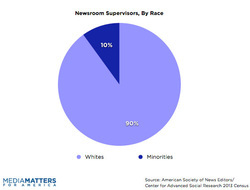 (also published on Women of Badassery
(also published on Women of BadasseryUpon researching this topic, I found that most articles claimed that underrepresentation and misrepresentation of minorities run rampant due to the unshakable racisms of news and entertainment media. However, I believe that though this was certainly the case in the days of “Gone with the Wind,” there are too many other competing factors to extricate racism as the sole case in today’s society.
In practice, modern-day racism is arguably a subset of classism–privileges or hardships based on socio-economic status—classism having an all-encompassing impact on the ability for minorities to present themselves as much as (and in the way they’d) like to be portrayed in TV, film and literature. Though there is a definite positive mobility towards more prevalent and accurate depictions of alternative groups, most writers, creators and directors are of the Caucasian male persuasion, causing a fairly limited scope of experiences to draw from for creative inspiration and character development.
Why is this? Why is it that according to a 2014 UCLA study, almost 90% of directors, 92% of screenwriters and 90% of show creators for broadcast television are Caucasian? It certainly explains the results of a recent statistical comb-through done by USC’s Journalism School, which surveyed the top 600 grossing films over a span of five years up through 2013 and found that about 74% of all speaking character roles were Caucasian.
The truth is it’s more complicated than simple racism; it’s systemic. Most aspiring minority directors, writer, actors and creatives simply don’t make it to the point where their scripts, plays and readings could be denied, as many of their talents never make it to a bona fide arts class, let alone a pitch desk. Whether due to lack of exposure, education or economic freedom, their opportunity is lacking far before a publishing or production agency has the chance to provide a rejection based on race. And as the inspiring African American 2015 Emmy award winner Viola David said, “The only thing that separates women of color from anyone else is opportunity.”
With stiff competition in these fields, you are expected to have a degree, a portfolio, a resume of previous works, proof of expertise and a willingness to invest in writing a full edited book, an edited screenplay or filming a well-produced spec filmed. Acquiring said clout and creating said works takes a lot of time, effort and study before you can present yourself as an economically viable venture—and it all depends on one’s level of exposure to the professional arts and one’s economic situations.
Let’s first tackle exposure. A 2009 to 2014 Directors Guild of America study found that only 13% of directors who embarked upon their first assignment in episodic television within that time-frame were minorities. Are there a high proportion of minority students with arts degrees not finding work, or are there a significantly low number of students receiving arts degrees in the first place? According to a 2008 survey by National Endowment for the Arts, only 26% of African Americans and 28% of Hispanics age 18-24 reported receiving arts education of any kind, with 58% of Caucasians reporting having received arts education. Many minorities never realize they may have a talent for writing and director. Sulin Iyengar, Director of Research at the Endowment, stated that the shortage in arts education in schools is a big reason for the lack of arts exposure in minorities since schools are the most likely place for minority and underprivileged students to receive instruction in the arts.
But the most important point is that it simply makes very little economic sense to attempt a career in writing, film, or even music for a minority especially considering the current economic climate. You’ve got to have a means to support yourself or a supportive family while creating your works. If you or your family is more focused on becoming economically stable (building a savings, working three shifts, putting children through school), it leaves little free time to make creating a priority. According to Local Area Unemployment Statistics (LAUS) and Current Population Surveys (CPS) the unemployment rate of African Americans in major cities in 2014 hold a range of 10.2% to 13.67 with Hispanics at 6.02% to 10.53% and Caucasians at 3.75% to 5.29%. These statistics demonstrate that economic stability is a greater issue for minorities than Caucasians and this in turn may keep minorities from exploring artistic careers.
I myself did not grow up in a very privileged situation, but was given the opportunity at an early age to understand and appreciate the importance of art, writing, music and creative expression as a mode of communication—not only allowing me the freedom to write and release music, and to write and publish novels, but the wherewithal to create an artistic business in order to support my artistic habits and help contribute to the portrayal of cultural diversity in the creative world.
The media portrays who ‘it’ thinks we are, and we react to that, believing ‘it’ is setting our standard of behavior. However, if one would like the media to portray what he or she wants to see, he or she must be the one to pick up the pen and write the scene. I believe it begins at the adolescent level, exposing to underprivileged students the importance of the media—arts, music, film and literature—and its portrayals on our society as a whole but also on our personal interactions, prejudices and moralizations. If one could be exposed to how much power the wielders of media truly hold, and have an equal economic opportunity to pursue that power, I believe the tone of the conversation would change drastically.



